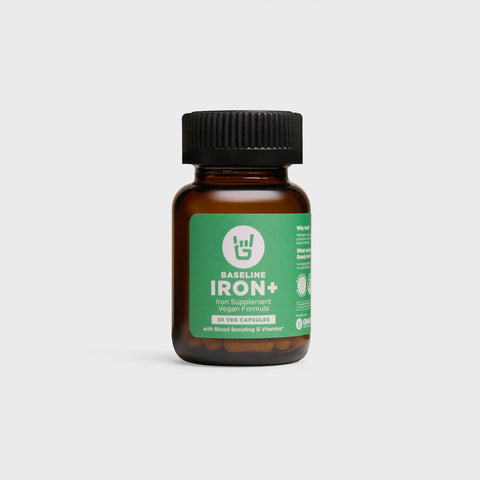We all have a few baseline needs to take care of in order to perform at our best. Vital to our success as athletes and general function as human beings is iron, a baseline requirement that also happens to be the number one nutritional deficiency in the world.
What is iron and what does it do in the body?
Iron is an essential mineral for the body to transport blood and oxygen. The two important science-y words we need to get to know here are “hemoglobin” and “myoglobin.” Iron to produce hemoglobin, a protein found in red blood cells that carries oxygen from the lungs to the rest of the body. Iron is also essential for the production of myoglobin,which transports oxygen to muscles. Without digging deep into the science it’s obvious that we need oxygen flow to lungs and muscles, regardless of athletic endeavors. That being said, some athletes are more likely to experience depleted levels of iron, which can harshly impact performance.
What does it feel like to be iron deficient? Pretty crappy. Symptoms of low iron include lethargy, increased or irregular heart rate, weakness, headaches, dizziness or lightheadedness, and shortness of breath. In athletes, this can lead to subpar performances despite everything else being in tiptop shape.
The issues with being iron deficient and who’s at risk
It’s entirely possible to get enough iron from the foods we eat everyday. Meat, seafood, dark leafy greens and beans all contain iron, which gets clumped into two groups: heme and non-heme iron. Heme iron is derived from meat products and non-heme iron comes from plant sources, and can sometimes be found in fortified foods like cereals and breads. For many people, these everyday whole-food sources of iron provide a sufficient amount.
However, three categories of individuals stand out at a higher risk for iron deficiency. These are: women of menstruating age, vegans and vegetarians, and endurance athletes. Falling into one of these categories equates to a higher risk of experiencing suboptimal levels of iron. Falling into two or all three of these categories significantly increases the likelihood of iron deficiency.

Iron’s impact on athletic performance
Now that we know iron is essential for getting oxygen to the lungs and muscles, let’s dive into what this means in terms of performance. Thankfully this relationship has been extensively studied. These studies repeatedly show that iron levels correlate with energetic efficiency and work capacity. One study looked at non-anemic female rowers over six weeks. The rowers who took an iron supplement showed greater improvement in energy expenditure than their counterparts who were taking a placebo. The rowers with iron supplementation also showed a slower lactate response, indicating a greater oxygen supply than rowers without iron.
Similar findings came from a study of female soldiers in military training. Not only did those with iron supplementation perform better than their counterparts with faster running times, they also reported higher scores on a self-assed mood test.
Overall, sufficient iron intake has a huge impact on performance, work capacity, heart rate and lactate concentration during exercise.
How to get enough iron and what to look for in an iron supplement
Although we’re nutrition nerds at Gnarly, we’re not able to replace a doctor who can better assess if an iron supplement is needed. It’s a good idea to check in with them for proper blood testing and diagnosis. Not all iron-deficient individuals are considered anemic, which is the most severe level of iron depletion. It’s also possible for some women and endurance athletes to experience iron deficiencies only at certain times in a menstrual or training cycle.
Gnarly’s Baseline Iron+ contains 25mg of iron bisglycinate. This large word at the end here that we won’t ask you to pronounce is a non-heme form of iron, making this product vegan and vegetarian friendly. It’s also gentle on the stomach, something not all iron supplements can claim. This form of iron is also highly bioavailable for the body to absorb.
Like marshmallows and campfire or a cold beer and mountain summit, some things naturally pair well together. Iron’s good friend is vitamin C. In any iron supplement, the addition of vitamin C helps the body absorb the iron, assisting in its bioavailability. Gnarly Baseline Iron+ contains 15mg of vitamin C to play well with iron, making this more effective than if iron were on its own.
When working on formulation, we recognized this supplement is extra important for vegans and strict vegetarians. They’re more likely to be iron deficient with a plant-based diet than those who eat meat. This also means they’re likely to be low on vitamin B12, another vitamin found predominantly in meat and seafood. The addition of 50 micrograms of B12 is also helpful with red blood cell production.
Gnarly Baseline Iron+ also contains 400 micograms of L-5 MTFH, the naturally occurring form of folate (vitamin B9). Folate also plays a vital role in the body’s production of red blood cells, which carry oxygen throughout the body. A folate deficiency can also lead to anemia and compromised athletic performance, a separate condition from anemia caused by a lack of iron. Gnarly’s Iron+ uses folate rather than the synthetic form, folic acid. Studies indicate that up to 40 percent of individuals in the United States have a genetic mutation that prohibits the body from converting folic acid into folate for absorption.
The TL;DR of iron and athletes
In short, iron is essential for oxygen transportation in our bodies. For endurance athletes, women of menstruating age and those eating a plant-based diet, iron deficiencies may be responsible for holding back peak athletic performance. Non-anemic iron deficiencies can often lurk in the background, going unnoticed but playing a role in energetic efficiency. Gnarly’s Baseline Iron+ is gentle on the belly with additional vitamins to make sure our athletes are hitting the iron levels that allow for maximal performance.
references
- Brumitt, J., McIntosh, L., & Rutt, R. (2009). Comprehensive Sports Medicine Treatment of an Athlete Who Runs Cross-Country and is Iron Deficient. North American journal of sports physical therapy : NAJSPT, 4(1), 13–20.
- Mayo Clinic Iron Deficiency Anemia
- DellaValle, D. M., & Haas, J. D. (2014). Iron supplementation improves energetic efficiency in iron-depleted female rowers. Medicine and science in sports and exercise, 46(6), 1204–1215. https://doi.org/10.1249/MSS.0000000000000208
- McClung, J. P., Karl, J. P., Cable, S. J., Williams, K. W., Nindl, B. C., Young, A. J., & Lieberman, H. R. (2009). Randomized, double-blind, placebo-controlled trial of iron supplementation in female soldiers during military training: effects on iron status, physical performance, and mood. The American journal of clinical nutrition, 90(1), 124–131. https://doi.org/10.3945/ajcn.2009.27774
- Stephanie Marino, Iron and vitamin C: the perfect pair?, Michigan State University Extension
- Vitamin B12 Fact Sheet, National Institutes of Health, Office of Dietary Supplements (ODS)





